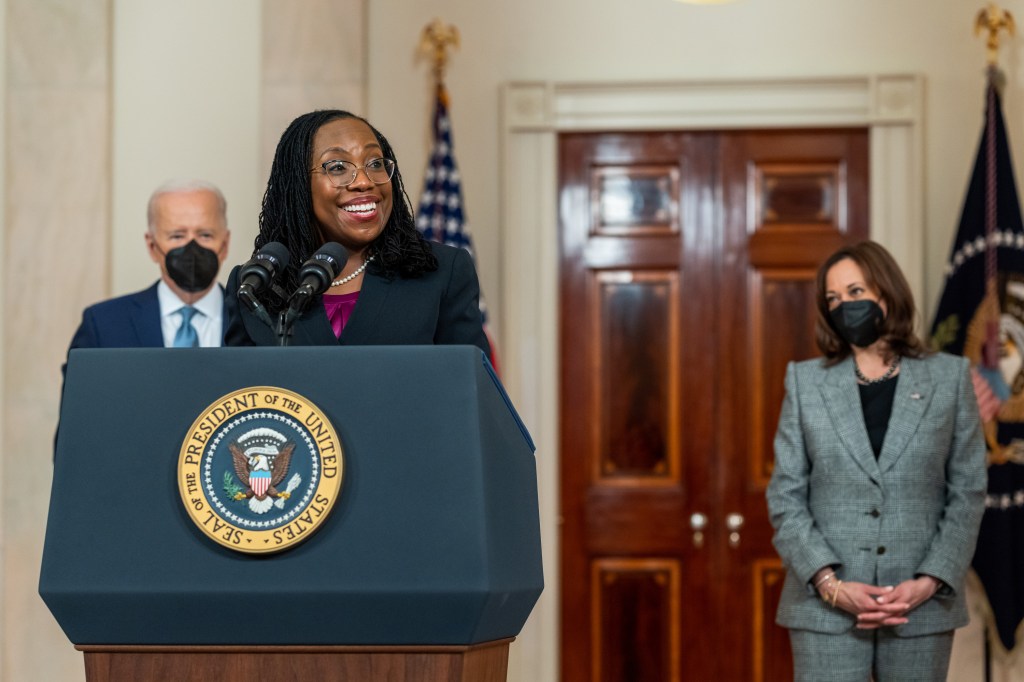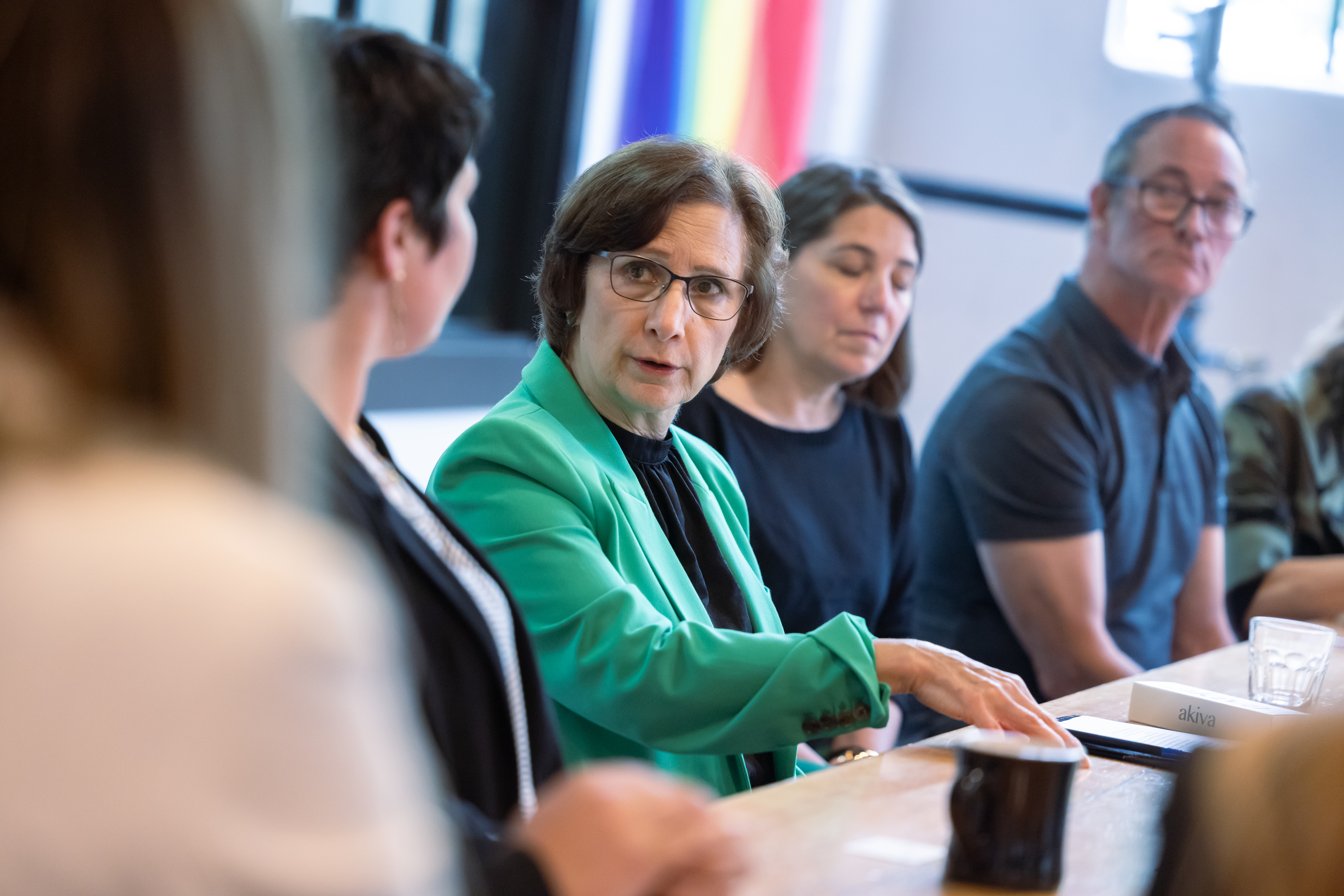Oregon backers hail first Black woman on U.S. Supreme Court
Published 3:30 pm Monday, April 11, 2022

- President Joe Biden and Vice President Kamala Harris look on while Judge Ketanji Brown Jackson delivers remarks on her nomination to the U.S. Supreme Court, Friday, February 25, 2022, in the Grand Foyer of the White House.
Even as Oregon supporters celebrated the Senate’s approval of the first Black woman to sit on the Supreme Court, Oregon’s senators warned of new challenges by the court’s current conservative majority and a potential Republican majority in the Senate next year.
The comments by Ron Wyden and Jeff Merkley, both Democrats, came in brief interviews Friday, after they and other speakers praised the confirmation of Ketanji Brown Jackson the previous day. She won the votes of all 48 Democrats and two independents who vote with Democrats, plus three of the 50 Republicans.
When she is seated this summer, after Justice Stephen Breyer retires, it will bring to four the number of women on the current court — and she will join Clarence Thomas as the second Black member on the court. Of the 115 justices preceding her, all but seven have been white men.
Wyden and Merkley had no reservations about voting for Jackson, and decried attempts by minority Republicans to denigrate her personally during Senate Judiciary Committee hearings.
The Oregon celebration took place in the courtyard of a Portland federal building where Wyden has an office — and a forecast of rain did not materialize.
“Judge Jackson will be a justice who reflects America,” said Oregon Attorney General Ellen Rosenblum, a former state trial and appeals court judge, who is the first woman to hold her current office since it was created more than a century ago.
“She will strive to ensure equal justice under law. She is a judge who actually has been in the trenches representing real people. We can rarely say this about nominees to this court — and it matters. Her record of accomplishment and public service and her unyielding commitment to equality make her uniquely qualified. She has an understanding of the Constitution that is deeper and broader than most of the current justices.”
Jackson is a former federal trial and appeals court judge.
Ulanda Watkins is a circuit judge in Clackamas County, and the first Black trial judge appointed outside Multnomah County.
“Yesterday’s historic confirmation of Judge Jackson brings a renewed confidence of fairness and equality in our justice system,” Watkins said. “With her ascension to the highest court of our nation comes hope that all things are possible. She is a north star to the countless people who dream one day of donning the black silk robes of a judge.”
The first Black judge in Oregon was Mercedes Diaz, appointed by Gov. Tom McCall in 1969, after she became the first Black woman to earn a law degree in Oregon in 1960. Judge Adrienne Nelson was elevated by Gov. Kate Brown in 2018 to become the first Black justice on the Oregon Supreme Court.
A similar theme was voiced by Ekua Hackman, president-elect of the Oregon chapter of the National Bar Association.
“I am still in disbelief that in my lifetime, I have the privilege of witnessing a dark-skinned woman sitting on the Supreme Court,” Hackman said to cheers from the audience.
Hackman said Jackson’s ascension is especially meaningful to an emerging generation of aspiring lawyers.
“These students are inspired and encouraged to know that despite the challenges and barriers, they can succeed and thrive,” Hackman said. “After seeing how motivated these students are to make a difference in people’s lives using a law degree, it has become a personal mission of mine to ensure that these students from underrepresented communities have the resources they need to apply to and succeed in law school, because their voices and perspectives are needed. The people they serve will feel a greater sense of ease, seeing that their attorney looks like them.”
First public defender
Lisa Hay has been the federal public defender in Oregon since 2014 — and Jackson is the first justice with that shared experience. Thurgood Marshall, the first Black justice, did some criminal defense work in an era before public defenders emerged as a result of a 1963 Supreme Court decision that required legal representation for criminal defendants.
Hay said 73% of inmates in federal prisons are Black or Hispanic — far out of proportion to their share of the nation’s population — and that while the Supreme Court does not directly affect charging or sentencing of criminal defendants at any level, the justices can ensure that the Constitution and laws are applied fairly.
“Her experience as a public defender will inform her understanding of the disparate impact of criminal law. I trust it will move our country closer to that ideal we all have been talking about: Equal justice under law.”
“I can tell you that public defenders, as much as anyone in the justice system, believe in the rule of law. Public defenders hold police and prosecutors accountable under the Constitution. We sound the alarm when the law is not applied equally and fairly.”
Senators’ warning
After the celebration, Wyden raised concerns about the likelihood of the court’s 6-3 conservative majority restricting or abolishing abortion rights — which have stood for 49 years, but are under challenge in two cases this term — and of the suggestion by one senator that the court should overturn a 1965 decision allowing use of contraceptives under a right to personal privacy. That decision, a precursor to Roe v. Wade in 1973, nullified a Connecticut law that went back to 1872.
“I said: What century are we in? It is an effort to turn back decades and decades,” Wyden said.
“It’s clear that Mitch McConnell (Senate Republican leader) is running this agenda to say the Democrats are soft on crime. Right in front of that strategy is the confirmation of judges,” with hostile comments from GOP senators that even the conservative National Review said were out of bounds.
Merkley went further. He had spoken for 15 hours in 2017 against President Donald Trump’s nomination of Neil Gorsuch to the court — the year after a Republican majority in the Senate refused to grant a hearing to President Barack Obama’s nominee for the same vacancy — but the majority cut off debate and allowed Supreme Court confirmations to proceed with only a simple majority.
Now that Democrats control the evenly-split Senate, with the tie-breaker held by Vice President Kamala Harris, Merkley said Republicans want to slow down the process. He quoted South Carolina Sen. Lindsey Graham, who said Republicans would have blocked a hearing on any Supreme Court nominee if they had been able to do so.
“Because the way the Senate rules are constructed, a simple majority has been able to proceed, and we have filled a lot of district and circuit court positions over the 15 months since Joe Biden came into office,” Merkley said.
“But I am concerned that if the Senate changes party leadership after the November election, they will block all of Biden’s nominees to the courts, no matter how qualified they are. It’s just wrong.”





